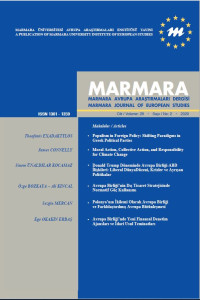Abstract
Avrupa Birliği (AB) dış eylemlerinde barış, özgürlük, demokrasi, hukukun üstünlüğü ve insan haklarına saygı ilkelerini, küresel ticaret politikası ile iç içe geçmiş normatif bir yaklaşımı benimsemektedir. Bu anlamda Birlik, üçüncü ülkelerle yürüttüğü ticari iş birliklerini normatif değerlere uyumlu hale getiren kapsamlı bir strateji izlemektedir. Birliğin normatif gücünün uluslararası alanda yayılması konusunda kullandığı en önemli politika alanlarından biri ticarettir. Yıllar içinde dönüşüm geçiren ticaret stratejisi normatif yaklaşıma paralel bir şekilde, AB kuralları, normları ve ilkeleri ile bütünlük kazanmıştır. Ticaret anlaşmaları, sürdürülebilir kalkınma programları ve bu kapsamda yürütülen finansman mekanizmaları, Birliğin normatif gücünün değerlendirilmesi için önemli örnekler sunmaktadır. Bu doğrultuda çalışmada, Birliğin dış eylemleri arasında sınıflandırılan dış ticaret politikasına normatif bir yaklaşımı nasıl entegre ettiği analiz edilmekte ve söz konusu kapsamda geliştirdiği ticaret anlaşması ve sürdürülebilir kalkınma yaklaşımı değerlendirilmektedir. AB’nin, ticaret politikası bağlamında ortaya koyduğu normatif değerlerle bütünleşen pratikler uygulayıp/uygulamadığı değerlendirmenin merkezi sorusunu teşkil etmektedir. Buna göre çalışma, normatif değerleri ile öne çıkan AB’nin ticaret politikası söz konusu olduğunda maddi çıkarlarını önceliklendirebildiği ve değerlerin teşvikini ise göreli olarak arka planda tutabildiği tezini ileri sürmektedir.
Keywords
Avrupa Birliği Küresel ticaret politikası normatif güç Herkes İçin Ticaret Stratejisi sürdürülebilir kalkınma
References
- United Nations Conference on Trade and Development (2020) “Generalized System of Preferences”, <https://unctad.org/en/Pages/DITC/GSP/ Generalized-System-of-Preferences.aspx>, (2 Kasım 2020).
- Youngs, R. (2004) “Normative Dynamics and Strategic Interests in the EU’s External Identity”, Journal of Common Market Studies, 42 (2): 415-435, DOI: 10.1111/j.1468-5965.2004.00494.
- Zhou, W. ve Cuyvers, L. (2011) “Linking International Trade and Labour Standards: The Effectiveness of Sanctions under the European Union’s GSP”, Journal of World Trade, (1): 63-85.
Abstract
The European Union (EU) created a normative approach of external action in which global trade policy and the principles such as peace, freedom, democracy, rule of law, and respect for human rights are interwoven. In this respect, the Union executes a comprehensive strategy that brings its commercial cooperation with third countries into compliance with normative values. Trade is one of the most important policy areas by which the EU expands its normative power throughout the world. The transforming trade strategy, in line with the normative approach, merged with the EU’s rules, norms and principles. Trade agreements, sustainable development schemes, and the finance mechanisms the Union operates to fund such schemes, present important cases by which to analyze the Union’s normative power. To this end, how the Union integrated a normative approach in its trade policy that is now classified as external action and on trade agreements and sustainable development in this context are evaluated. Whether the EU actually executes the trade policy practices merged with the normative values constitutes the central question of the paper. This study asserts that when it comes to trade policy, the EU can prioritize material interests, relatively making the promotion of values a secondary issue.
Keywords
European Union global trade policy normative power Trade for All Strategy sustainable development
References
- United Nations Conference on Trade and Development (2020) “Generalized System of Preferences”, <https://unctad.org/en/Pages/DITC/GSP/ Generalized-System-of-Preferences.aspx>, (2 Kasım 2020).
- Youngs, R. (2004) “Normative Dynamics and Strategic Interests in the EU’s External Identity”, Journal of Common Market Studies, 42 (2): 415-435, DOI: 10.1111/j.1468-5965.2004.00494.
- Zhou, W. ve Cuyvers, L. (2011) “Linking International Trade and Labour Standards: The Effectiveness of Sanctions under the European Union’s GSP”, Journal of World Trade, (1): 63-85.
Details
| Primary Language | Turkish |
|---|---|
| Journal Section | Makaleler |
| Authors | |
| Publication Date | December 31, 2020 |
| Published in Issue | Year 2020 Volume: 28 Issue: 2 |


